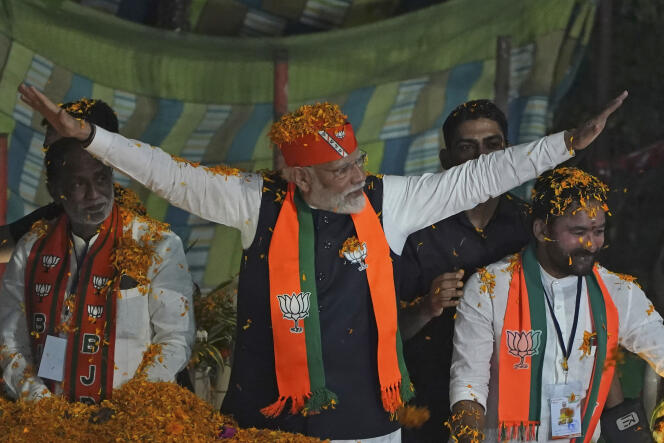


Is India heading for Narendra Modi's third victory in a row? The next legislative elections are due in the spring, which means the opposition has barely four months to get into fighting order. In view of the latest regional ballot, however, this challenge seems out of reach.
The latest elections, the last test before 2024's big event, left the main opposition party weakened and, conversely, strengthened the prime minister's position. The Bharatiya Janata Party (BJP) – Indian People's Party – won three states, while the Congress Party won just one. "The echo of these elections will be heard all over the world," the Hindu nationalist trumpeted to his supporters, turning the results into a personal victory. As always, India's strongman has saturated the political space, employing all the state's resources in the service of his party. He will go into the 2024 competition with a psychological edge.
For the Congress Party, a win in the final stretch could have broken the sense of fatalism and foregone defeat and consolidated its leadership of the opposition. Instead, it failed to do so. And yet, its results are by no means a debacle, far from it. On the contrary, the party put in a good performance, winning around 40% of the vote, on par with its results in the previous elections, from which it emerged victorious. It retained its base (the poor, the farmers, the lower castes) but failed to attract new voters, whereas the BJP, long the party of the upper castes, considerably broadened its electorate. It is successfully winning over the upper strata of the lower castes as well as voters from small regional parties and non-aligned parties.
"The poll shows a very strong bipolarization of the Indian political scene, to the BJP's benefit," noted Gilles Verniers of the Centre for Policy Research. The political scientist considers this a significant development "as an increasingly bipolar party system requires political formations to adopt different mobilization strategies, targeting voters well beyond their traditional bases. The ability to attract new voters and broaden its electoral base is currently the main key difference between the Congress Party and the BJP."
Against Modi, the party of the Nehru-Gandhi dynasty, which ruled the country for almost five decades, is hampered by weak leadership at the national level and fratricidal wars at the regional level. Rahul Gandhi, twice defeated by the Hindu nationalist, seems always to be going backward. His great trek across the country on foot in 2022 was a worthwhile initiative but one that needed to be capitalized on. As the descendant of a line of prime ministers, the son of Rajiv Gandhi, grandson of Indira Gandhi and great-grandson of Nehru is capable of empathy but struggles to commit and lacks the work ethic of a prime minister entirely devoted to the cause.
You have 55% of this article left to read. The rest is for subscribers only.
